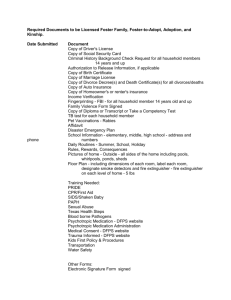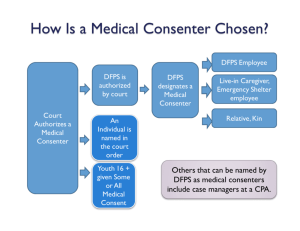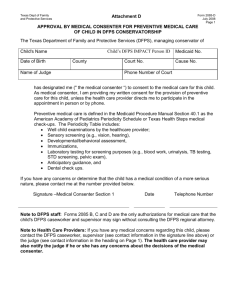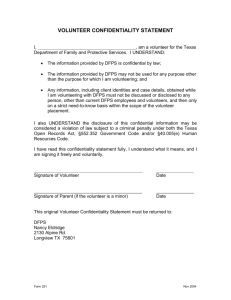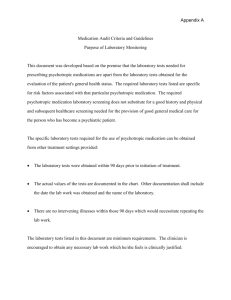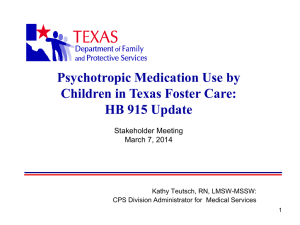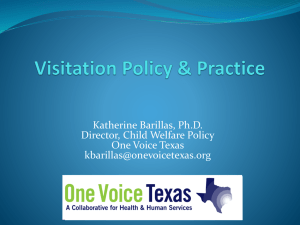The State of Texas Health Care Oversight and
advertisement
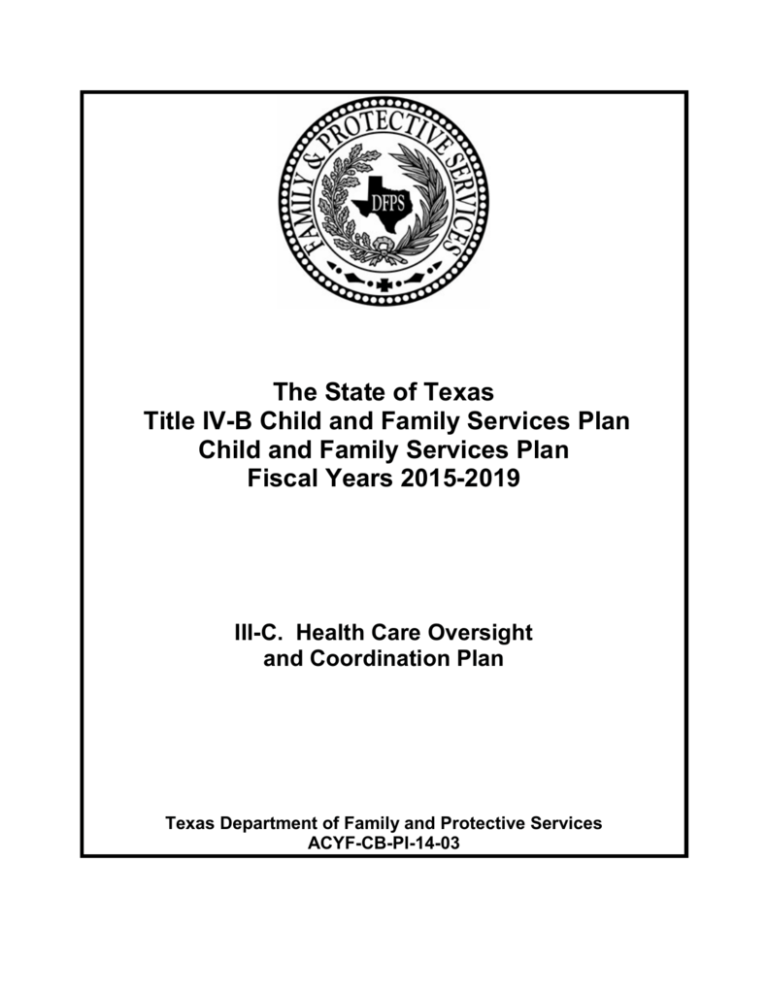
The State of Texas Title IV-B Child and Family Services Plan Child and Family Services Plan Fiscal Years 2015-2019 III-C. Health Care Oversight and Coordination Plan Texas Department of Family and Protective Services ACYF-CB-PI-14-03 2015-2019 Child and Family Services Plan C. Health Care Oversight and Coordination Plan ►Description of the plan for providing ongoing oversight and coordination of health care services for children in foster care. DFPS has a number of systems in place to oversee and coordinate the health care provided to children in DFPS conservatorship and to involve medical professionals in assessing the health and well-being of children. These systems include a single managed care organization for all children, the designation of a medical consenter for each child, DFPS policy, Residential Child Care Contract requirements, Residential Child Care Licensing Minimum Standards, judicial review of medical care, and specialized staff designated to DFPS medical services and Medicaid eligibility. Development of Plan to Coordinate Health Care Single Managed Care Organization Effective September 2005, the Texas Family Code Chapter 266, required the Texas Health and Human Services Commission (HHSC), which is the Texas Medicaid agency, to coordinate with DFPS to develop a comprehensive health care delivery system for children in DFPS conservatorship. In response, DFPS and HHSC collaborated between 2005 and 2008 to design a model tailored to the unique needs of these children, in consultation with pediatricians, health care experts, child welfare experts and recipients of child welfare services. HHSC entered into a contract with Superior Health Plan Network in 2007 to administer the health plan, called STAR Health. STAR Health was implemented in April 2008 and provides medical, behavioral health, dental, vision, and pharmacy (added in 2011) services. DFPS continues to collaborate on a day-to-day basis with HHSC and STAR Health, to ensure oversight and coordination of health care services for children. Joint Team meetings with HHSC, STAR Health and DFPS leadership are held monthly to resolve problems and plan innovations. The STAR Health system includes features such as: • • • • Expedited enrollment for immediate access to Medicaid benefits. An initial Texas Health Steps checkup - Early and Periodic Screening, Diagnosis, and Treatment (EPSDT) 1 - for children within 30 days of entering foster care. Integrated physical and behavioral health care. Health care coordination through medical homes, dental homes, service coordination and service management. 1 The Early and Periodic Screening, Diagnosis, and Treatment (EPSDT) service is Medicaid's comprehensive preventive child health service (medical, dental, and case management) for individuals from birth through 20 years of age. In Texas EPSDT is known as Texas Health Steps (THSteps). EPSDT was defined by federal law as part of the Omnibus Budget Reconciliation Act (OBRA) of 1989 legislation and includes periodic screening, vision, hearing, and dental preventive and treatment services. In addition, Section 1905(r)(5) of the Social Security Act requires that any medically necessary health care service listed in the Act be provided to Texas Health Steps (EPSDT) recipients even if the service is not available under the State's Medicaid plan to the rest of the Medicaid population. These additional services are available through the Comprehensive Care Program. Health Care Oversight and Coordination Plan Page 2 of 19 • • • • • • • • • • Telephonic health screenings when children enter care or change placements, with questions about medical needs, behavioral health needs and psychotropic medications. Enhanced access to services through a network of providers and service coordination. A Health Passport, which is a web-based electronic health record for each child; A plan for oversight and review of psychotropic medications. Location of STAR Health Liaisons in CPS regional offices to work closely with CPS Well Being Specialists to address health care needs of children. Monthly mini-webinars for CPS staff related on various STAR Health services. The provision of training to children's caregivers and residential providers about STAR Health services, Trauma-Informed Care, and related topics. Participation, as needed, in family group conferences and other case staffings conducted by CPS related to children's health care needs. An electronic interface to allow the transmission of key data from the DFPS IMPACT system to the Medicaid and STAR Health systems. Seven-day, 24-hour nurse and behavioral health hotlines for members, caregivers and medical consenters. DFPS Policy, Contract and Standards DFPS policy, the Residential Child Care contract, and Residential Child Care Licensing Minimum Standards have a number of provisions in place to ensure that children's health care needs are met and that health care is coordinated. DFPS licensed and contracted residential operations are required to have policies and procedures in place to address routine and emergency diagnosis and treatment of medical and dental problems, routine health care relating to pregnancy and childbirth for pregnant youth, and the provision of health care services to children with primary medical needs. Residential contracts and licensing staff monitor a random sample of cases to ensure compliance with these requirements. CPS caseworkers must also follow up with children's caregivers regarding the provision of preventive and medically necessary health care and complete a summary of medical care for court reports. Medical Consenter Texas Family Code and DFPS policy require a court authorized or DFPS designated medical consenter for each child in DFPS conservatorship. Typically, DFPS designates emergency shelter staff or live-in caregivers when children are placed in community settings and CPS staff when children are placed in facilities, such as residential treatment centers. The medical consenter must complete training on informed consent, be knowledgeable of the child’s health care needs, participate in each medical appointment, keep CPS updated about children's medical care and ensure that the child's health needs are met. DFPS provides training on medical consent to all CPS staff and caregivers who are medical consenters through online training and handouts. It is now required as part of pre-service and annual training for all medical consenters. In response to enactment of House Bill 915 of the 83rd Texas Legislature, effective September 1, 2013, this training Health Care Oversight and Coordination Plan Page 3 of 19 was revised to incorporate information about trauma informed care, informed consent for psychotropic medications and the appropriate use of non-pharmacological interventions prior to or concurrently with psychotropic medications. Medical consenters must sign a form at the conclusion of the training acknowledging that they understand the principles of informed consent for psychotropic medications and the need to consider the use of non-pharmacological interventions appropriately before or along with psychotropic medications. The acknowledgment form must be presented as evidence of completion of the training before DFPS staff designates them as medical consenters. DFPS ensures that CPS staff complete the training and contracted residential childcare providers ensure that their staff and foster parents complete the training. DFPS also created a Medical Consenter email address to receive questions about medical consent from staff and stakeholder, such as staff, caregivers and residential contractors. The online Medical Consent training is located at http://www.dfps.state.tx.us/Child_Protection/Medical_Services/medical-consenttraining.asp. Youth receive training on informed consent as part of the health section of the Life Skills training offered through the Preparation for Adult Living program after a youth turns 16. DFPS has processes in place to inform 16 and 17 year old youth of their right to request the court to authorize them to consent to their own medical care according to the Texas Family Code. DFPS policy and Medical Training address the requirement for medical consenters to involve youth in decisions about their health care in developmentally appropriate ways. Youth who have been authorized by the court to consent to some or all of their own medical care or who are aging out of DFPS conservatorship are now required to complete the online Medical Consent training. If these youth take psychotropic medications, they must also complete the online Psychotropic Medication training. Judicial Review of Medical Care CPS caseworkers include a summary of medical care in each court report. The court is required to review the child’s medical care at each hearing, under Texas Family Code Chapter 263. Court hearings provide a venue for individuals involved with a child to raise concerns about the child's health care needs and treatment. Courts sometimes issue orders addressing children's health care needs. In response to House Bill 915 of the 83rd Texas Legislature, DFPS amended court reports for permanency and placement hearings to also address: • Behavior strategies and psychosocial therapies considered before or used concurrently with psychotropic medications; • The expected timeframe the child will need to take the medications and other medications tried; • The expected benefits of the any psychotropic medication the child is taking; • Dates of appointments; and • That the youth 16 and older was notified about their right to request the court to authorize them to consent to some or all of their own medical care and the youth’s response. Health Care Oversight and Coordination Plan Page 4 of 19 Specialized Staff DFPS has multiple specialized staff dedicated to the coordination and oversight of health care services for children in DFPS conservatorship and who are eligible for Medicaid. Dedicated staff include the following: • DFPS Medical Director, who is a child and adolescent psychiatrist, interfaces with other state agencies, health care providers, the judicial system, legislators and other external stakeholders; coordinates with HHSC and STAR Health in efforts to improve medical services and ensure the appropriate prescribing of psychotropic medications; and provides consultation to DFPS staff related to health care policies, the behavioral health needs of children served by DFPS and psychotropic medications. • CPS Director of Services who is responsible for DFPS oversight and management of Medicaid eligibility and medical services. • Division Administrator of Medical Services who coordinates CPS medical services, medical policy, and psychotropic medication activities, works closely with HHSC and STAR Health staff, supervises Medical Services Program Specialists and Well Being Specialists, and serves as a liaison to the Forensic Assessment Center Network and the regional nurse consultants. • Medical Services Program Specialists who manage medical services initiatives, develop medical policies/processes, liaison with other DFPS programs, health and human services agencies and STAR Health on Medicaid benefits/services, children's mental health, and ensure DFPS compliance with decree orders resulting from the Frew lawsuit and Alberto N. settlements. • Seven Well Being Specialists who are located in the regions and serve as liaisons between frontline CPS staff and STAR Health. They are subject matter experts on CPS medical services and work closely with STAR Health Liaisons located in CPS offices to facilitate access to health care for children. • Nine CPS regional nurse consultants who provide consultation to CPS staff regarding children’s health care needs, educate staff about disease processes, medications and treatment plans, assist with the DFPS psychotropic oversight activities, and attend various CPS staffings as requested, such as removal staffings, death reviews and family group conferences. • Division Administrator for Federal and State Support, who is responsible for ensuring that eligibility issues are resolved in a timely manner, supervises staff responsible for resolving issues that contribute to barriers that prevent smooth enrollment in or transition out of the automated systems supporting eligibility for STAR Health; and • Exceptions Lead, who helps resolve problems that prevent Medicaid eligibility from being established. Collaboration to Ensure the Appropriate Use of Psychotropic Medications The Supreme Court of Texas Permanent Judicial Commission for Children, Youth and Families (Children's Commission) formed a multi-disciplinary workgroup in 2011 led by the DFPS medical director and a judge to study the psychotropic medication oversight process in Texas, the information-sharing process between the court and the state's many child welfare professionals, and the consent process for psychotropic Health Care Oversight and Coordination Plan Page 5 of 19 medications. After meeting for approximately a year, the Children's Commission held a Psychotropic Medication Roundtable on July 6, 2012 to facilitate a discussion among a larger group of stakeholders. The Children Commission produced a report that contains about twelve recommendations that impact courts, DFPS and others. Some of the recommendations were incorporated into proposed legislation for strengthening informed consent for psychotropic medications, which later passed into law by the 83rd Texas Legislature as House Bill 915, effective September 1, 2013. With the passage of House Bill 915, the Children's Commission and DFPS assembled a 60-member stakeholder workgroup to oversee an implementation plan addressing DFPS, court, attorney and guardian ad litem requirements in the bill. The workgroup met four times over the course of the implementation of House Bill 915 and concluded on March 7, 2014. The membership of the group consisted of approximately 60 participants and included judges, representatives of advocacy groups, legislative staffers, medical professionals, youth and parent representatives, DFPS staff, and HHSC staff. Participants also include representatives from the STAR Health contractors, Superior and Cenpatico. Schedule for Initial and Follow-up Health Screenings CPS policy requires that children in DFPS conservatorship receive preventive and medically necessary health care through Texas Medicaid's Texas Health Steps program, Early and Periodic Screening, Diagnosis, and Treatment (EPSDT), including: • An initial Texas Health Steps medical checkup within 30 days of entering foster care and subsequent Texas Health Steps medical checkups annually for children 36 months of age and older; • More frequent Medical and Dental Checkups may be required by the EPSDT or Texas Health Steps Periodicity Schedule; • An initial Texas Health Steps dental checkup within 60 days of entering foster care beginning at age six months and subsequently every six months; and • Expanded Medicaid benefits through Texas Medicaid's Health Steps Comprehensive Care Program. The CPS Medical Service team developed and delivered a required training addressing Texas Health Steps requirements to front line staff who work with conservatorship cases. Texas Health Steps requirements are also included in the general Medical Consent training which is required for all medical consenters. Additionally, STAR Health offers a similar training for foster parents and residential providers. STAR Health developed a Kinship Outreach Team who contacts kinship caregivers to explain STAR Health services, Texas Health Steps requirements, and helps them set up Texas Health Steps appointments. How Health Needs Will Be Monitored and Treated CPS policy, DFPS Residential Child Care Licensing Minimum Standards and the Residential Child Care Contract require foster parents and residential providers to ensure that health needs identified through Texas Health Steps screenings are followed up and treated. DFPS licensed and contracted residential operations are required to Health Care Oversight and Coordination Plan Page 6 of 19 have policies and procedures in place to address routine and emergency diagnosis and treatment of medical and dental problems, routine health care relating to pregnancy and childbirth for pregnant youth, and the provision of health care services to children with primary medical needs. DFPS Contract and Licensing staff monitors residential operations for compliance with these requirements. Children have medical and dental homes to help ensure health care needs are identified and treated and STAR Health is required to provide all medically necessary preventative screenings and Medicaid covered health services. Per contract, STAR Health provides telephonic health screenings upon entry into conservatorship and at placement changes in order to ensure that every child’s needs are known by the caregiver and are fully met. STAR Health follows up with caregivers about such needs through their Service Management and Service Coordination programs. STAR Health develops a Health Care Service Plan for any youth that require Service Management assistance. HHSC’s Health Plan Management staff monitor the health plan to ensure that all telephonic screenings and Service Plans are occurring within contractually required timeframes. CPS caseworkers must also follow up with children's caregivers regarding the provision of preventive and medically necessary health care and complete a summary of medical care for court reports. One of the lessons DFPS learned is that caseworkers and supervisors needed additional guidance on assessing for safety and well-being and meeting the health care needs of children with primary medical needs. DFPS developed more detailed policy, tools to guide staff when making home visits, and computer based training addressing all stages of CPS service. These materials provide practical supports for caseworkers and supervisors, such as: • Provision of a reference guide with questions to ask children, caregivers and healthcare providers • Instruction on assessing and using the child's communication method in the interview • Education on observing the child, his or her medical equipment and supplies, and physical environment • Provision of educational materials on medical equipment, supplies and terminology including visual aids • Identification of regional experts, such as well-being specialists, nurses and development disability specialists who can assist caseworkers • Other supporting resource and reference materials DFPS continues to produce and monitor monthly reports on compliance with Texas Health Steps and is working with the Health and Human Services Commission on reporting regarding the compliance with Texas Health Steps periodicity requirements for medical and dental checkups for children in DFPS conservatorship through age 17, including children enrolled in STAR Health. DFPS learned that changes were needed in reporting data in order to outreach to Child Placing Agencies to improve compliance with 30 day check-ups for children entering DFPS conservatorship. In FY 2014 DFPS, Health Care Oversight and Coordination Plan Page 7 of 19 the Human Services Commission and STAR Health plan to collaborate to review trends in compliance with Texas Health Steps among Child Placing Agencies. How Medical Information Will Be Updated and Shared The Texas Family Code requires HHSC to provide a Health Passport record for each child in conservatorship. The Health Passport electronic health record application is a tool provided as part of STAR Health. The Health Passport is populated with two years of health care history for children who were enrolled in Medicaid or Children's Health Insurance Program (CHIP) prior to entering DFPS conservatorship (about 52% of children entering care). The system then continues to populate with present day data through claims submission and information transmitted from the DFPS IMPACT system (medical consenters, demographics, etc.) Information in the Health Passport includes the name and address of each of the child's health care providers, the child's medical consenters, a record of each visit to a health care provider, a record of immunizations, identification of the child's known health problems and information on all prescriptions. Medical consenters, Court Appointed Special Advocate staff, certain authorized users for each residential operation, health care providers and CPS staff have access to children's Health Passport records for the specific children they serve. DFPS is piloting a project with judges to determine the most effective process for providing Health Passport access to judges. DFPS is also required by the Texas Family Code to provide a copy of the Health Passport record to caregivers when DFPS conservatorship is dismissed and to young adults who age out of care. CPS staff are required to provide a detailed Summary of Medical Care in each court report, including physical health care, behavioral health care, and details about all medications, and other related information. Court reports are provided to the Court Appointed Special Advocates, attorneys and guardians ad litem and judges. Residential child care providers keep records of children's medical and behavioral health visits and provide them to CPS. CPS caseworkers also share medical information with the individuals involved in children's cases, such as biological parents, caregivers, medical consenter, residential child care staff, Court Appointed Special Advocates and attorneys ad litem. Specific to psychotropic medications, DFPS has revised policy to require caseworkers to notify parents of the initial prescription of psychotropic medications and any dosage changes at the next scheduled meeting with the caseworker after the prescription. Although the medical consenters have the legal authority to consent to medical care, other individuals involved in the case are offered opportunities to provide input into some medical decisions and express concerns about medical care provided. Steps to Ensure Continuity of Care and Consultation with Physicians and other Professional to Determine Appropriate Medical Treatment HHSC and DFPS developed STAR Health as the primary means to ensure ongoing consultation with health care providers and continuity of health care for children in Health Care Oversight and Coordination Plan Page 8 of 19 DFPS conservatorship. DFPS follows the requirements of Texas Health Steps for assessing the health, well-being and determining appropriate medical care for children. STAR Health functions that help ensure continuity of care include the Health Passport, the establishment of medical and dental homes for children, integration of medical and behavioral health care, and medical and behavioral health service management and service coordination. When children enter DFPS conservatorship, change placements or their medical needs change, STAR Health is contractually required to conduct a telephonic general health screenings with caregivers to address children's medical and behavioral health needs and any psychotropic or other medications they take. Children with complex behavioral health, medical or intellectual developmental disabilities are assigned service managers who are either registered nurses or master's level behavioral health clinicians, depending on the child's primary need. Service managers develop a health care service plan, provide medical case management, outreach to caregivers regularly and may make home visits. STAR Health has a number of specialized service management programs to address certain complex needs, such as diabetes, transplant, and Start Smart program to follow pregnant teens and their newborns. Children with less complex needs are provided with service coordination. Service coordinators must facilitate access to primary, dental and specialty care and support services, including providing assistance with locating providers and scheduling appointments as necessary. Finally, STAR Health has a discharge planning team to provide planning and coordination for children who are being discharged from an in-patient setting. To ensure a smooth transition and coordination/continuity of medical care for children with complex medical conditions, DFPS holds multi-disciplinary, primary medical needs case staffings at removal, and placement changes and transitions to adoption or reunification. The purpose is to plan the transition of medical care, such as specialized training for the new caregiver, transportation of the child and durable medical equipment, or services needed in the home such as private duty nurses, specialists, or others. Well-being Specialists facilitate the staffings and those in attendance may include STAR Health service managers or coordinators, DFPS direct delivery staff, placement staff, CPS regional nurse consultants and sometimes the DFPS medical director, the STAR Health medical director, health care providers, residential providers, caregivers, biological parents, Court Appointed Special Advocates (CASA), and attorneys ad litem. CPS placement staff conduct similar staffings that include some of the same representatives to plan the discharge of children from psychiatric hospitals. The Superior Health Plan Network contract for Star Health, DFPS policy, the Residential Child Care Contract and Residential Child Care Licensing Minimum Standards contain requirements to ensure children receive appropriate follow-up for health care needs. Beginning March 1, 2014, children and young adults who are in DFPS conservatorship and who are dually eligible for Medicare and fee-for-service Medicaid began receiving Health Care Oversight and Coordination Plan Page 9 of 19 care management services through the Texas Medicaid Wellness Program operated by McKesson Corporation. The program is a whole-person care management service that supports Medicaid clients’ individual health needs and challenges. Dually eligible children are not enrolled in STAR Health. Steps to Ensure That Transition Plans Include Required Elements Relating to Health Care Needs Transition Plan During the development of a youth's transition plan, DFPS policy requires staff to inform youth about the importance of designating a health care or medical power of attorney to make health treatment decisions on behalf of the youth if he or she becomes unable make these decisions. DFPS discusses information about the medical power of attorney and health care options with youth during their Transition Plan Meeting, Circle of Support, Preparation for Adult Living training, and other meetings between the youth and caseworkers. In response to House Bill 915, DFPS revised the youth Transition Plan to address physical/mental health care and resources. The purpose is to ensure that youth transitioning out of foster care have improved ability to exercise informed consent, understand their own health care needs, know how to safely manage any psychotropic medications prescribed and know how to access health care resources. As of January 2014, caseworkers were trained on the new Transition Plan form in January 2014. Medicaid for Former Foster Care Youth Effective January 1, 2014, the Affordable Care Act extends the period of Medicaid eligibility for former foster care youth until age 26, known in Texas as the Former Foster Care Children program. The extended health care coverage is available to young adults who age out of Texas foster care and are receiving Medicaid. This population will receive services in two separate programs based on age: Young adults aged 18 through 20 will be enrolled in STAR Health but can switch to STAR, and young adults aged 21 through 25 will receive Medicaid through the STAR Medicaid managed care plan of their choice through the end of the month of their 26th birthday. The current program, known in Texas as Medicaid for Transitioning Foster Care Youth, will continue to be available for former foster youth who are younger than 21 and are not eligible for the Former Foster Care Children program because they were not receiving Medicaid at the time they aged out. Young adults who age out of foster care from a state other than Texas are no longer eligible for Medicaid for Transitioning Foster Care Youth. Those currently receiving Medicaid for Transitioning Foster Care Youth who aged out of foster care from another state will continue to receive Medicaid for Transitioning Foster Care Youth until they turn 21 or no longer meet the eligibility requirements, whichever occurs first. Health Care Oversight and Coordination Plan Page 10 of 19 Individuals receiving Former Foster Care Higher Education Medicaid through STAR Health who were eligible for the Former Foster Care Children program were automatically transitioned to the Former Foster Care Children program on January 1, 2014. Individuals receiving Former Foster Care In Higher Education but not eligible for Former Foster Care Children will continue to receive Former Foster Care In Higher Education through STAR Health until their 23rd birthday or until they no longer meet the eligibility requirements, whichever comes first. CPS caseworkers, Preparation for Adult Youth staff and youth specialists have been instructed to inform youth about these changes to Medicaid programs during Circles of Support or Transition Plan Meetings (before leaving care), PAL Life Skills classes, in Aging out Seminars, and upon request. CPS caseworkers, PAL staff and youth specialists are also required to tell Transition Centers, PAL contractors, caregivers, and community partners about the changes. Information on Medicaid programs for transitioning foster care youth is also available on the STAR Health Member Handbook online and the DFPS Texas Youth Connection web site. Training of Staff and Providers to Support the Treatment of Emotional Trauma/Trauma-Informed Care Initiative DFPS recognizes the long-term effects of adverse childhood experiences such as child abuse and neglect and the need to address trauma as an important component of effective service delivery. DFPS anticipates that the transition of the Texas child welfare system into a trauma-informed system of care will promote child emotional and wellbeing, reducing the use of psychotropic medications, increasing placement stability, and more timely permanency. DFPS launched a Trauma-Informed Care initiative in October 2011. The goal of the initiative, which is currently underway, is to build capacity to use trauma-informed practice strategies across the child welfare system. Four subgroups were established to focus on specific sectors of this work: 1. Trauma-informed assessments/screening tools. Review the evidence-based and evidence-informed assessment protocols that incorporate trauma history as part of optimal mental and behavioral health care that would best serve children and families and make recommendations to DFPS leadership. • This subgroup made recommendations for trauma screenings and assessments and has concluded. DFPS is working with key stakeholders, including HHSC, to incorporate trauma screening and assessment processes for children in DFPS substitute care. 2. Trauma-informed training. Develop trauma-informed training for staff, caregivers, and external stakeholders, including classroom as well as computerbased applications. • This subgroup has developed a cross-walk comparing traumainformed care competencies identified in the National Child Traumatic Stress Network Child Welfare Toolkit with the current DFPS training Health Care Oversight and Coordination Plan Page 11 of 19 curriculum. The group is determining what curriculum must be developed or purchased to address identified gaps. In addition to this subgroup, the agency is working with the University of Texas at Austin School of Social Work to develop training for CPS supervisors to supervise with a trauma-informed focus. 3. Trauma-informed caregiver support. Develop recommendations and protocols for supporting kinship caregivers. • This subgroup has shifted their focus to kinship caregivers and their needs regarding parenting children who have experienced trauma. They have surveyed kinship caregivers and will make recommendations for this specific population of caregivers. The subgroup will work on providing kinship development workers with trauma-informed care resources to support placements. 4. Trauma-informed staff support. Develop recommendations and protocols for supporting staff affected by secondary traumatic stress, direct trauma, compassion fatigue burnout, and compassion success. • This subgroup has presented its recommendations to CPS direct delivery management and formed a charter group to implement them. Recommendations include building awareness by managers of the effects of secondary traumatic stress, and developing peer support for staff and managing coverage when staff are on leave. The group is working with the DFPS Employees Assistance Program to tap existing services designed to support staff awareness regarding secondary trauma, with a plan to begin in DFPS Regions 8 and Region 1. All four subgroups are co-led by DFPS staff and external stakeholders and include representatives across the child welfare system. DFPS developed a governance plan to support the Trauma-Informed Care Strategic Plan that was approved by DFPS leadership in May 2012. The core group first met in October 2011 and continues to provide direction for this TIC Initiative. Statewide training to date include: • Cenpatico (STAR Health's behavioral health provider) developed and initially provided Trauma-Informed Care training to all levels of regional staff and some State Office staff (about 8,000 CPS staff) during FY 2010-2011, which exceeded the new requirement in the Texas Family Code. Cenpatico provides this training to residential providers, foster parents and kinship caregivers upon request. • The Center for Learning and Organizational Excellence has incorporated Trauma-Informed Care training into Basic Skills Development and a two-hour online refresher course. Completion of the refresher course is required for CPS program and contract staff annually. • DFPS posted a two-hour online training on Trauma-Informed Care on the DFPS public website at http://www.dfps.state.tx.us/Training/Trauma_Informed_Care/default.asp. Health Care Oversight and Coordination Plan Page 12 of 19 • • • • • The DFPS Residential Contract requires contractors to ensure that foster parents and direct caregivers complete the online Trauma Informed Care Training during pre-service training and annually thereafter. Resources include training offered by Cenpatico and materials on the National Child Traumatic Stress Network. DFPS requires Trauma-Informed Care training for DFPS foster homes. Cenpatico offers training on Trauma-Informed Care to health care providers in the network upon request. They also seek Trauma-Focused Cognitive Behavioral Therapy qualified therapists as part of their network, known as the TraumaInformed Care Specialty Provider Network. They also offer training to certify behavioral health therapists as Trauma-Informed Care therapists. In FY 2014, CPS has joined other stakeholders in collaborating with the Texas Department of State Health Services initiative to certify qualified therapist in Parent Child Interaction Therapy (PCIT). Among the 12 therapists selected for training, two are part of the Cenpatico network. Four others, already certified in PCIT, were selected for Level 1 training to become "train the trainers" to expand the base of certified PCIT therapist in Texas. In FY 2014, the Department of State Health Services is consulting with CPS on the development of an online provider education module on Trauma Informed Care for EPSDT/Texas Health Steps providers. A number of other child welfare stakeholders, such as Court Appointed Special Advocates (CASA), judges, and attorneys ad litem, have an interest in TraumaInformed Care and include workshops on the topic in their various conferences. DFPS is collaborating with experts and exploring ways to enhance caregiver practices that address the impact of trauma and how caregivers can help children recover and attain social and emotional well-being. Comprehensive Coordinated Screening, Assessment and Treatment Planning to Identify Mental Health Needs and Trauma-Treatment Needs Current Practice for Identifying and Treating Mental Health Needs DFPS identifies the mental health needs of children through mental health or developmental screenings during EPSDT within 30 days of entering conservatorship. Additionally, DFPS may identify mental health needs as caseworkers gather information for the child's and the family service plans and Residential Operations receives information for an Admission Assessment required by Residential Child Care Licensing Minimum Standards. Psychological evaluations and psychiatric examinations are conducted on children when indicated. Psychological evaluations are required before children are admitted for treatment services for mental health disorders or intellectual developmental disorders and for placement of children for adoption. The evaluations also assist in case planning, service coordination, and in determining recommendations to the court. Although DFPS does not currently have a standardized process to screen all children for trauma, many child welfare stakeholders identify children's trauma and refer them for evidence-based, trauma-informed treatment. Cenpatico has developed a network of Health Care Oversight and Coordination Plan Page 13 of 19 behavioral health therapists trained in Trauma-Focused Cognitive Behavioral Therapy. Cenpatico has also hired a director to promote evidence-based and other promising trauma-focused practices in the Texas child welfare system. DFPS continues to coordinate with Cenpatico and HHSC to implement practices, such as Parent Child Interaction Therapy within the network. In response to House Bill 915, Texas created numerous strategies to ensure the appropriate use of psychotropic medications by strengthening informed consent processes, training, the judicial review of medical care, notification of parents, and transitioning planning. DFPS now requires medical consenters (CPS staff and caregivers) to attend all psychotropic medication appointments for children in person. Previously, medical consenters were allowed to participate by phone. The medical consenter and health care provider must also complete and sign the "Psychotropic Medication Treatment Consent form" for each new psychotropic medication. This form was developed in response to House Bill 915 and covers the elements of informed consent for psychotropic medication for children in foster care. As part of the consent process for psychotropic medications, the health care provider and medical consenter must consider any non-pharmacological interventions that should be tried before or concurrently with psychotropic medications. The medical consenter must also ensure that the child receives the recommended interventions. DFPS defined non-pharmacological interventions as any psychosocial therapies and behavior strategies provided to the child or youth. These interventions can help the child heal from trauma, cope with traumatic stress, learn to self-regulate, and achieve social and emotional wellbeing. STAR Health is working on building clinical capacity to provide, trauma-informed, evidence-based psychosocial therapies. All medical consenters are required to ensure that children taking psychotropic medications have an appointment with the health care provider at least every 90 days to: • Appropriately monitor the side effects of the medication. • Decide whether the medication is helping the child achieve the treatment goals. • Decide whether continued use of the medication is appropriate. With stakeholder input, DFPS developed a family friendly brochure, “Making Decisions About Psychotropic Medications,” which includes expectations regarding psychotropic medication by children in conservatorship. The brochure addresses nonpharmacological interventions, informed consent, how to talk to health care providers about children’s behavioral health needs and psychotropic medications, requirements for follow-up appointments with health care providers, involving youth in decisions, side effects and other concerns, etc. Caseworkers are required to give the brochure to all medical consenters. Development of a Psychosocial Assessment with Trauma Screening DFPS recognizes the need to streamline the assessment process and is working with stakeholders to develop a comprehensive psychosocial assessment process. The goal Health Care Oversight and Coordination Plan Page 14 of 19 is to ensure that parties responsible for the child have a comprehensive, traumainformed psychosocial assessment on which to base behavioral health treatment, placement, intervention strategies and case-planning decisions. This assessment would help identify trauma and the need for ongoing behavioral health treatment or referral for further evaluation. Children with certain psychiatric disorders or intellectual development disabilities would still receive psychological evaluations, as appropriate. Streamlining the process would also prevent duplicative assessments by multiple parties. DFPS anticipates this will take at least another year to implement and may be phased in to evaluate the effectiveness and refine the process. DFPS may also receive direction and guidance from the Texas Legislature in 2015 that may impact policy and implementation. As discussed above, the Trauma Informed Assessment/Screening workgroup concluded in November 2014 after submitting recommendations for a menu of evidence-based trauma assessment and screening measures for use by behavioral health providers. Protocols to Monitor the Use of Psychotropic Medications Texas implemented a comprehensive protocol to monitor, track and address the prescribing of psychotropic medications to children in DFPS conservatorship. It was implemented after DFPS coordinated with Health and Human Services Commission, STAR Health, and the Texas Department of State Health Services. The protocol consists of the following components: Psychotropic Medication Utilization Parameters for Children and Youth in Foster Care The parameters are best practice guidelines for use of psychotropic medication for children and youth in foster care. They include general principles, reference material, a listing of commonly used psychotropic medications with dosage ranges and indications for use in children, and nine criteria for indicating need for further review of a child's clinical status. The parameters were first released in February 2005 and updated in January 2007, December 2010, and September 2013. The fourth edition is at: http://www.dfps.state.tx.us/documents/Child_Protection/pdf/TxFosterCareParametersSeptember2013.pdf. This edition also includes updated information on evidenced-based assessment/treatment, medication tables, and FDA/literature based dosage ranges. Psychotropic Medication Utilization Review STAR Health is contractually required to conduct ongoing oversight of the psychotropic medication regimens of children to ensure compliance with the parameters. If the child's psychotropic medication regimen appears non-compliant, the case is referred for a Psychotropic Medication Utilization Review. The need for a review is triggered by one of the following: Health Care Oversight and Coordination Plan Page 15 of 19 • • • • A Telephonic General Health Screening (calls to caregivers of the child) conducted by STAR Health service managers when a child enters care, changes placement or status changes indicate a need for a Psychotropic Medication Utilization Review. An automated review of Medicaid pharmacy claims data indicates a need for a Psychotropic Medication Utilization Review. An outside request from CPS nurse consultants, caseworkers, court appointed special advocates, foster parents, attorneys, residential child care providers or others. A court requests a Psychotropic Medication Utilization Review. STAR Health Behavioral Health Service Managers (Masters level clinicians) conduct a preliminary screening of identified cases in which psychotropic medication regimens appear to be outside parameters. The information gathered during the preliminary screening is reviewed by a child psychiatrist and, if indicated, forwarded to a child psychiatry consultant for a formal review and peer-to-peer consultation to the prescribing physician. The child's case is then tracked by STAR Health to ensure that the child's psychotropic medication regimen complies with the parameters. Quarterly Psychotropic Medication Monitoring Workgroup meetings This task force (chaired by the DFPS medical director) includes representatives from DFPS, Health and Human Services Commission, Department of State Health Services, STAR Health and the University of Texas at Austin School of Pharmacy. STAR Health manages the overall psychotropic medication monitoring program. Activities include quarterly reports from HHSC pharmacy claims data regarding medication usage, STAR Health reports on the PMUR outcomes, Quality of Care activities and any issues surrounding Health Passport functioning and usage. The group is updated as to any ongoing research activities regarding Texas foster care and the general Medicaid population. The group also oversees the biennial updates of the parameters. Quality of Care Reviews STAR Health reviews physicians identified as having concerning practice patterns through the Psychotropic Medication Utilization Review process. Physicians who consistently prescribe “outside parameters" are referred to the STAR Health Credentialing Committee for further investigation and action. A Quality of Care review includes a review of any additional medical records requested and a peer-to-peer interview with the prescriber. The credentialing committee determines if t a physician should be placed on a corrective action plan, which could include disciplinary action up to and including termination from the network. In response to House Bill 915 passed by the Texas Legislature in 2013, processes are now in place: • For quarterly psychotropic medication monitoring by the HHSC Medicaid Vendor Drug Program Pharmacy Utilization Review contractor for: o Children placed in Texas under the Interstate Compact for the Placement of Children (ICPC) not enrolled in STAR Health. Health Care Oversight and Coordination Plan Page 16 of 19 • o Children in conservatorship who are dually eligible for Medicare and Medicaid, typically have end-stage renal disease, and are not enrolled in STAR Health. To notify the home state of any child placed in Texas under ICPC when the medication regimen is outside the parameters. CPS well-being specialists and regional nurse consultants monitor the medication of dually eligible children and will continue to assist their caregivers in accessing reimbursement for medication co-pays. How the Child Welfare Workforce and Providers Are Trained on the Appropriate Use of Psychotropic Medications DFPS created an online Psychotropic Medication Training for CPS Staff, Foster Parents and Residential Providers, which is available internally and at http://www.dfps.state.tx.us/Training/Psychotropic_Medication/. The training includes topics such as: • Appropriate use of non-pharmacological interventions before consenting to psychotropic medications. • Informed consent. • How to talk to doctors. • The Psychotropic Medications Utilization Parameters for Foster Children. • Administering and monitoring psychotropic medications. • How to report concerns to STAR Health and children's health care providers. DFPS updated the training based on House Bill 915 to include: • Online Medical Consent and Psychotropic Medication trainings were revised to add requirements for informed consent for psychotropic medications, information about trauma-informed care and use of non-pharmacological interventions. • New and existing medical consenters are now required to complete the new Medical Consent training initially and annually, sign the Acknowledgement and Certificate of Completion of Medical Consent Training form and provide a copy to CPS caseworkers at time of placement. • All CPS staff, and any caregivers who serve children taking psychotropic medications, must complete the online Psychotropic Medication training preservice and annually. • DFPS has provided classroom training, in addition to the online training, for CPS staff attending psychotropic medication appointments at residential operations. • After classroom training has been completed around the state, DFPS will hold monthly calls with CPS medical consenters for about six months to allow them to ask questions. CPS program and contract staff must complete the online training annually. Other child welfare stakeholders may access the training on the DFPS website. Residential Child Care Licensing Minimum Standards require foster parents and caregivers who administer psychotropic medications to receive pre-service and annual Health Care Oversight and Coordination Plan Page 17 of 19 training on psychotropic medications. Residential operations may use the DFPS online training or provide the training themselves. The DFPS Residential Child Care Contract requires residential operations to follow the principles of the Psychotropic Medication Utilization Parameters for Foster Children and to report concerns to STAR Health. DFPS is finalizing a simple, family friendly brochure to help medical consenters when they talk to doctors about psychotropic medications. The brochure addresses topics such as involving youth in discussions and decisions, trying non-pharmacological interventions as appropriate before consenting, questions to ask doctors and follow-up requirements. DPFS also coordinated with STAR Health to create a family-friendly training on informed consent for psychotropic medications targeting caregivers. Finally, DFPS is updating the general Medical Consent training to make it more userfriendly and include information on consenting to psychotropic medications, considering non-pharmacological interventions appropriately and Trauma-Informed care. Informed and Shared Decision-making (Consent and Assent) and Methods for Ongoing Communication between the Prescriber, Child, Caregivers, Health Care Providers, Caseworker, and Other Key Stakeholders Texas has numerous systems to share decision-making and information about children's psychotropic medications. Children's medical consenters, who are typically children's live-in foster or relative caregivers, emergency shelter staff or CPS staff, have the legal authority and duty to provide informed consent for psychotropic medications for children in conservatorship. Medical consenters are required to involve youth in decisions about their medical care. Medical consenters who are not DFPS staff are required to notify DFPS of a new prescription for a psychotropic medication by the next business day. Residential operations ensure that foster parents and staff who administer psychotropic medications follow DFPS requirements, monitor for side effects, the child's response to psychotropic medications, and follow-up with the prescriber at least quarterly and immediately when the child experiences significant side effects or adverse reactions. DFPS monitors the overall medical care of children and the performance of medical consenters and acts to change the medical consenter when needed. The court reviews court reports provided by DFPS at each court hearing, which includes detailed information about children's psychotropic medications. The court hearing provides one of several venues for interested parties to raise any concerns about children's psychotropic medication regimens. CPS caseworkers also share medical information with the individuals involved in children's cases, such as biological parents, caregivers, medical consenter, residential child care staff, court appointed special advocates and attorneys ad litem. Although the medical consenters have the legal authority to consent to medical care, other individuals involved in the case can provide input into some medical decisions and express concerns about medical care provided. Health Care Oversight and Coordination Plan Page 18 of 19 Effective Medication Monitoring at Both the Client and Agency Level DFPS requires that children prescribed psychotropic medications receive follow-up with their health care providers at least quarterly. Caregivers who administer medications are required to monitor children's progress and report side effects to physicians. Courts review children's psychotropic regimens and STAR Health tracks children's prescriptions and conduct Psychotropic Medication Utilization Reviews when indicated. A Psychotropic Medication Monitoring Group quarterly reviews data, trends and plan innovations to improve the process. Availability of Mental Health Expertise and Consultation Regarding Consent and Monitoring Issues by a Child and Adolescent Psychiatrist The majority of children in DFPS conservatorship who take psychotropic medications are under the care of either a general psychiatrist or a child and adolescent psychiatrist. STAR Health child and adolescent psychiatrists provide consultation to prescribers who are outside the parameters during the Psychotropic Medication Utilization Review process. The DFPS medical director, who is a child and adolescent psychiatrist, consults with CPS regarding policies and practices addressing the consent to and monitoring of psychotropic medications. He also periodically participates in case staffings to address the behavioral health needs and psychotropic medication regimens of children with complex needs. Mechanisms for Sharing Accurate and Up-to-Date Information Related to Psychotropic Medications to Clinicians, Child Welfare Staff and Consumers The Psychotropic Medication Utilization Parameters for Foster Children provide a listing of commonly used psychotropic medications with dosage ranges, indications for use in children and common side effects/adverse reactions. This information is updated periodically by the University of Texas School of Pharmacy. The Health Passport also provides detailed information on each psychotropic medication that is typically included in pharmacy inserts. STAR Health offers training and information to clinicians. Psychotropic medication training is often included in various conference offered to DFPS staff, external stakeholders and clinicians. Health Care Oversight and Coordination Plan Page 19 of 19
